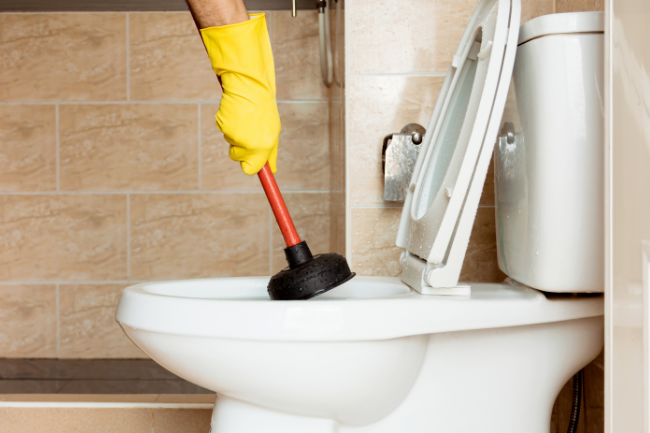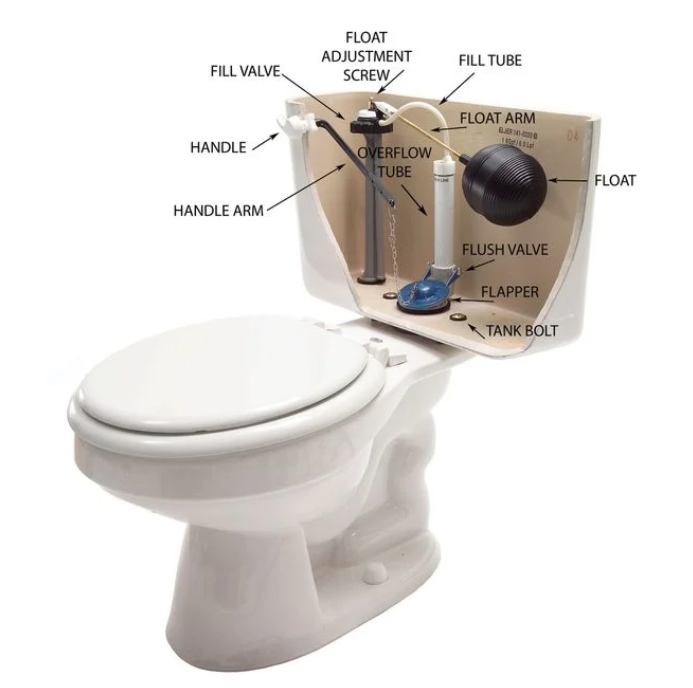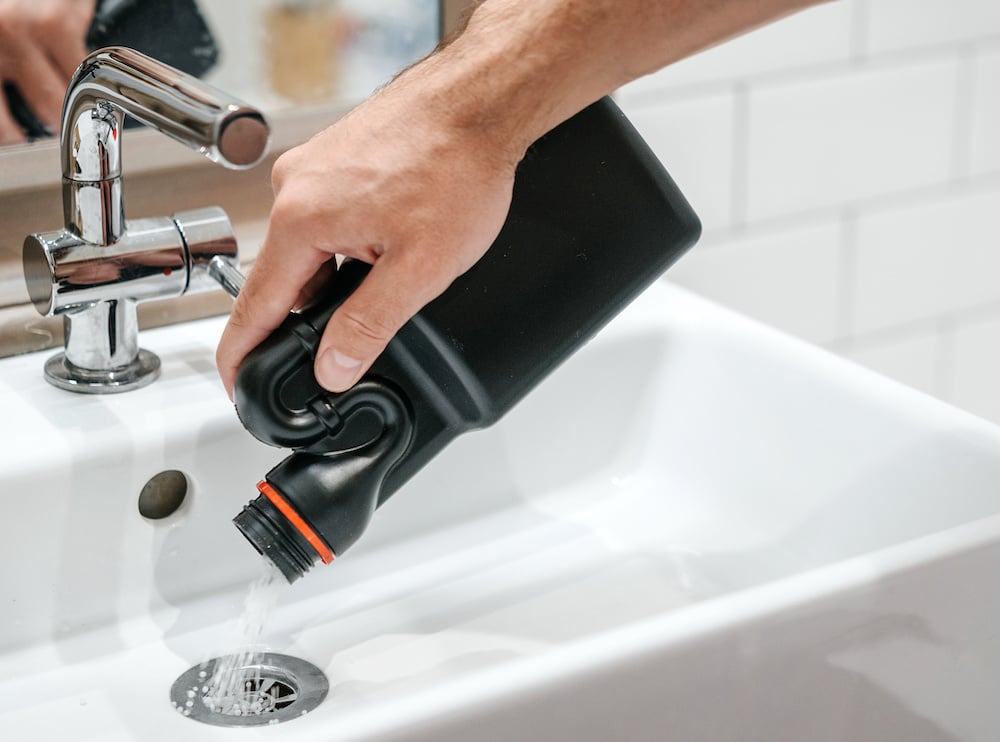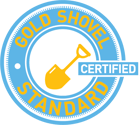Home Plumbing Inspection vs. Commercial Plumbing Inspections
Posted by William Heinselman on
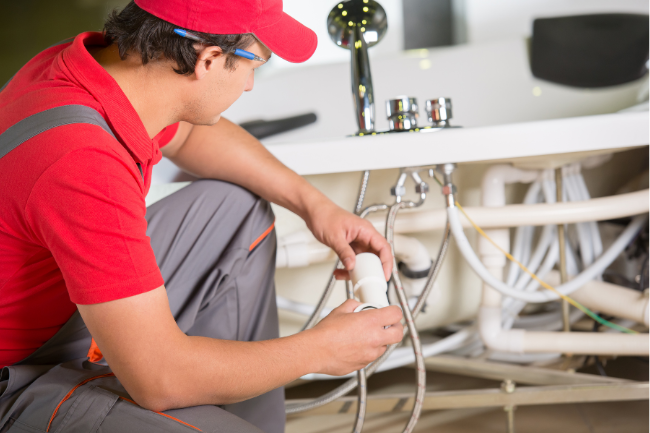
Plumbing systems, whether in residential homes or commercial establishments, are the unsung heroes of modern life, delivering clean water and whisking away waste with the quiet efficiency we often take for granted. But as with any intricate system, they demand vigilant care and attention to ensure they continue to function seamlessly.
Why Are Plumbing Inspections Important?
Plumbing inspections are vital for several compelling reasons.
They serve as a proactive measure to detect and address potential issues before they escalate into costly and disruptive problems. Regular inspections can identify hidden leaks, deteriorating pipes, or clogged drains, preventing water damage and structural issues.
Moreover, these assessments contribute to water conservation efforts by identifying and fixing leaks that might otherwise go unnoticed, helping homeowners and businesses reduce water waste.
Here's a list of the top reasons why getting your plumbing inspected is crucial:
- Verify your plumbing's age: Unless you’re buying a brand-new home that was just constructed, it can be hard to tell how old the plumbing is at a glance.
- Check pipe integrity: Another reason to have a plumbing inspection done on a new home’s pipes is to make sure that all the pipes are properly joined and have no major flaws.
- Negotiating value: Having all the information you can is always good when you’re trying to negotiate with a real estate agent or homeowner—especially in sales where the building is being sold “as-is.”
- Identify and fix plumbing problems early: If there is a problem with the plumbing in a house, fixing it early can save you a lot of time, trouble, and money later on. Leaks in water or wastewater pipes can cause several unpleasant problems, such as mold growth, pest infestations, and worse. The faster you can find and fix a problem, the smaller it will generally be.
Ultimately, plumbing inspections provide peace of mind, ensuring the uninterrupted flow of clean water and the efficient removal of waste, while also safeguarding property value and minimizing unexpected repair expenses.
Residential Plumbing Inspections
Residential plumbing inspections are systematic assessments of a home's plumbing system, encompassing pipes, fixtures, and related components.
Here’s a step-by-step process for a typical home plumbing inspection:
- Schedule an Inspection: Contact a licensed plumber or plumbing service to schedule a residential plumbing inspection. Choose a reputable professional with experience in residential plumbing systems.
- Preliminary Assessment: Before starting the inspection, the plumber will discuss any specific concerns or issues you may have with your plumbing system. This helps tailor the inspection to address your unique needs.
- Visual Inspection: The plumber will begin by visually inspecting all accessible plumbing components. This includes checking faucets, fixtures, pipes, drains, and water supply lines for any visible signs of wear, damage, or leaks.
- Water Pressure Check: Water pressure is crucial for efficient plumbing. The plumber will measure water pressure to ensure it falls within the recommended range. High or low water pressure can indicate underlying problems.
- Drainage Inspection: Drains, sinks, and toilets will be checked for proper drainage. The plumber will identify any slow drains or blockages that need attention, as well as ensure that traps and vents are functioning correctly.
- Water Heater Examination: If applicable, the water heater will be inspected for signs of corrosion, leaks, or sediment buildup. The plumber will also verify that the temperature and pressure relief valve is in good working order.
- Pipe Inspection: The plumber will assess the condition of both visible and accessible pipes. This includes checking for rust, corrosion, or any damage that may compromise the plumbing system's integrity.
- Leak Detection: Special equipment, such as moisture detectors or infrared cameras, may be used to detect hidden leaks behind walls or under floors. Identifying and addressing leaks promptly can prevent water damage and mold growth.
- Report and Recommendations: After the inspection, the plumber will provide a detailed report of their findings, including any issues discovered and their recommendations for repairs or maintenance. They will also discuss any potential upgrades or improvements to enhance your plumbing system's efficiency.
- Maintenance Plan: Discuss a maintenance plan with the plumber to schedule routine check-ups or necessary repairs. Regular maintenance helps prolong the lifespan of your plumbing system and prevents unexpected emergencies.
Residential plumbing inspections are essential for maintaining the health and functionality of your home's plumbing. By following these steps, you can ensure that your plumbing system remains in optimal condition, saving you time and money in the long run.
DIY Home Inspection Checklist
To help you inspect your plumbing, here’s a quick DIY home plumbing inspection checklist. These features should also be inspected before purchasing a new home.
- House Taps: Every faucet, showerhead, spigot, and other water-dispensing fixture should be tested at least once a week. Turn on the hot and cold water lines for each fixture and check for stuttering, low water pressure, odd noises, or discoloration. These could indicate a clog forming in the drain pipe.
- Exposed Pipes: On a monthly basis, check the exposed pipes in your home and check for signs of corrosion or damage. Joints in the exposed pipe should be checked for leaks or weak seals. If you’ve insulated your pipes, make sure the insulation is dry and intact.
- Emergency Shutoff Valves: It’s important to know where all of the shutoff valves throughout the house are located and to test them monthly. After engaging each valve, test the faucets they serve and see if those faucets still dispense water.
- Water Meter: While you have all of the faucets in the home turned off and the main shutoff valve engaged, check to see if the meter is still moving. If the meter is going when the emergency shutoff is engaged, you may have a faulty meter or a major leak. Considering how new most of the meters in Sacramento are, the latter is more likely.
- Water Heater: Water heaters should be clear of other obstacles so you can inspect them. Do not touch the water heater’s pipes or the heating element without proper protection (gloves, eyewear, etc.). Visually inspect the pipes and connections of the heater for signs of corrosion or leaks.
This very basic inspection checklist can help you find a lot of the most common plumbing problems. For more detailed inspections of pipes that run under your yard or behind your walls, floors, and ceilings, you’ll probably want to hire a professional to do that inspection for you.
Commercial Plumbing Inspections
A typical commercial plumbing inspection is a comprehensive assessment of a commercial property's plumbing system. It goes beyond the scope of a residential inspection due to the complexity and size of commercial plumbing systems.
Here are 12 features that are commonly included in commercial plumbing inspections:
- Visual Inspection: The plumber will visually inspect the entire plumbing system, including pipes, fixtures, and water-using appliances. This assessment helps identify visible issues such as leaks, corrosion, or damaged components.
- Water Supply Assessment: The inspection includes a review of the property's water supply system, checking for proper water pressure and flow. Any issues related to water supply pipes, meters, or pressure regulators are noted.
- Drainage Inspection: All drains, including sinks, floor drains, and toilets, are inspected to ensure they are draining properly. The plumber checks for clogs, blockages, or any slow drainage issues.
- Sewer Line Inspection: A camera inspection may be conducted to assess the condition of the sewer lines. This helps detect blockages, root intrusions, or damage within the sewer system.
- Backflow Prevention: Commercial properties often require backflow prevention devices to protect the public water supply. These devices are inspected to ensure they are functioning correctly and in compliance with local regulations.
- Water Heaters: Commercial water heaters, which are typically larger and more complex than residential units, are examined for leaks, corrosion, and proper operation. The plumber checks temperature settings and safety features as well.
- Boiler Systems (If Applicable): For properties with boiler systems, the inspection includes a thorough examination of the boiler's components, controls, and safety devices.
- Grease Traps and Interceptors: In restaurants or food service establishments, grease traps, and interceptors are inspected to ensure they are functioning properly and are in compliance with local codes.
- Fire Sprinkler Systems (If Applicable): Commercial properties with fire sprinkler systems may have these systems checked during a plumbing inspection to ensure they are in working order.
- Water Quality Testing: In some cases, water quality testing may be conducted to check for issues like water hardness, pH levels, or contaminants.
- Code Compliance: The inspection includes a review of the plumbing system's compliance with local building codes and regulations. Any violations or necessary upgrades are noted.
- Report and Recommendations: After the inspection, a detailed report is provided to the property owner or manager. This report includes findings, recommendations for repairs or maintenance, and a plan for addressing any compliance issues.
Commercial plumbing inspections are essential for maintaining the safety, functionality, and compliance of plumbing systems in large-scale properties. Regular inspections can help prevent costly plumbing emergencies, ensure water quality, and extend the lifespan of plumbing components.
Plumbing Inspection Similarities & Differences
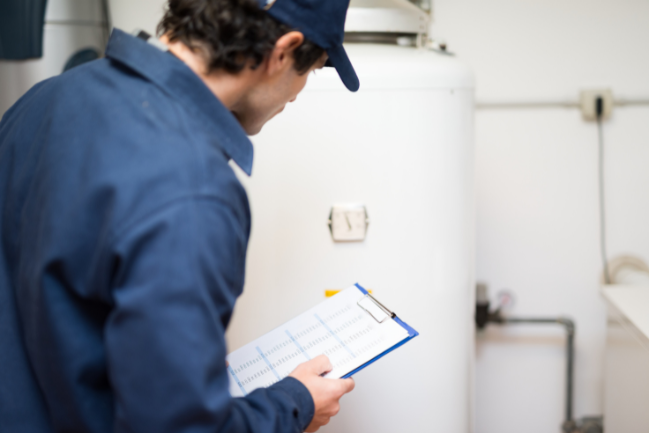
Residential and commercial plumbing inspections share some similarities but also have significant differences due to the varying scale and complexity of the plumbing systems involved. Here's a breakdown of their similarities and differences.
Similarities
Commercial and residential plumbing inspections share several fundamental similarities. Both types of inspections begin with a visual assessment of the plumbing system, aiming to identify visible issues like leaks and corrosion. In both cases, fixtures such as sinks, toilets, and faucets are checked to ensure proper functioning and freedom from leaks.
Additionally, drainage systems are assessed to verify efficient water flow and to uncover any blockages or slow drainage problems. Lastly, compliance with local building codes and regulations is a common thread, as both residential and commercial inspections prioritize adherence to these standards to ensure safety and plumbing system integrity.
Differences
Commercial and residential plumbing inspections differ significantly in scale and scope. Commercial inspections involve larger, more complex systems, often spanning multiple floors and incorporating specialized components like industrial water heaters, backflow prevention devices, and complex drainage systems. Compliance with industry-specific regulations and codes, such as those for healthcare or food service establishments, is paramount in commercial inspections.
In contrast, residential inspections focus on smaller-scale plumbing systems typical of homes, encompassing fixtures, water heaters, and basic piping. They generally involve less specialized equipment and fewer regulatory requirements, making them more straightforward compared to their commercial counterparts.
Inspection Tips When Buying a New Home
If you're in the market for a new home, here are some tips when going through the inspection process.
- First, ask the seller to help you check the plumbing. Most reputable real estate agents and home sellers with help you verify the condition of any aspects of the home you wish to check.
- Once you begin your inspection, you should start by locating the house's water meter and check the shut-off valve to see if it is functioning properly. For homes operating on a well water system, this valve is normally located under the kitchen sink in the home but can be elsewhere within the house.
- Inspect the pipes. Check not only for signs of corrosion or damage, such as worn connections or residue but also find out what materials the pipes are made of and their diameters. If the house is older, specifically if it was built before 1986, there may be lead pipes in the home. Lead is a known toxin and can pollute the house's water supply. If the house does have lead pipes, have an appraisal done for the cost of replacement and see if you cannot have that appraisal value deducted from the cost of the sale.
- Check the hot water heater. Inspect it for capacity, age, location, and condition.
- Verify the waste disposal system. Does waste water go to a municipal disposal system or does the home have a septic tank? If the home uses a septic tank, check to see where it is on the property, what its capacity is, and where the connecting lines are located.
- If you live in an area that is expected to experience severe weather within the next few years, make sure the plumbing system is equipped to handle the expected weather conditions.
- Check and operate every water dispensing system in the home. Flush all of the toilets, and run all of the faucets. After you have finished running each system, see if the faucets drip or if the pipes underneath the sinks are leaking.
Inspections that are performed for buyers may find plumbing issues that need to be addressed before the sale can be finalized. This situation gives both parties the opportunity to 1) renegotiate the price of the property, 2) leave it as-is and adjust the home's price, or 3) allow the seller to have repairs made before closing.
Each case is different, and some plumbing issues are so severe that a sale cannot go forward without action first being taken. If you run into residential plumbing issues during your inspection, call Express and we’ll be right out!
Hire a Trusted Professional for Your Next Plumbing Inspection
The plumbers from Express Sewer & Drain can handle both small-scale residential plumbing inspections and large commercial plumbing inspections.
Whether it's safeguarding the comfort and convenience of Sacramento homeowners or ensuring the uninterrupted operation of commercial establishments, Express Sewer & Drain plumbers provide comprehensive plumbing inspection services tailored to the unique needs of each client, ensuring plumbing systems remain reliable and trouble-free. Contact us today to learn more about our services!
Topics: Commercial Plumbing, Home Plumbing

